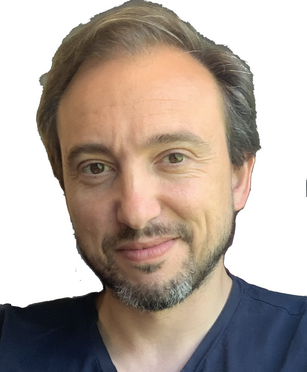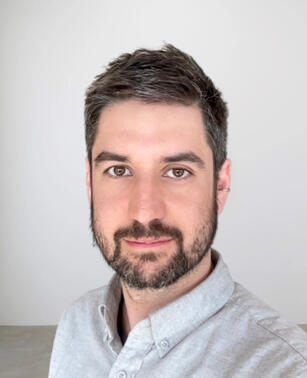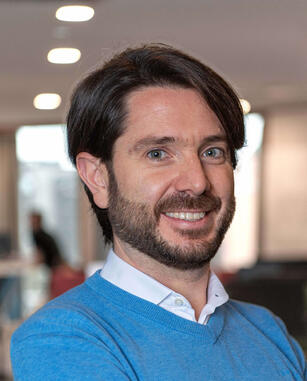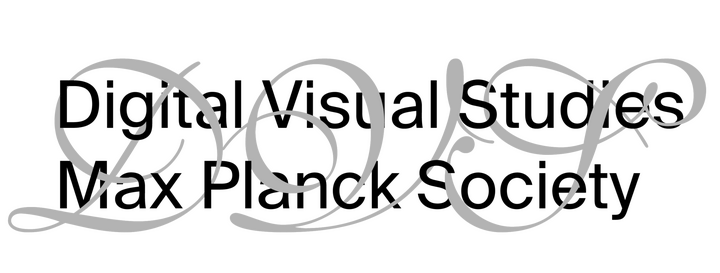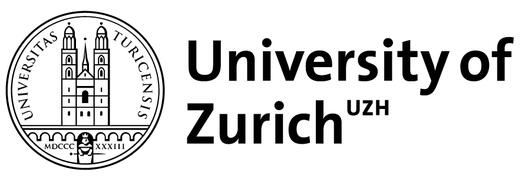AI
& Cities
2024
Digital Double: Situating and Troubling AI Technologies for Architectural Reconstruction and Urban Simulation
Symposium. October 24-25, 2024
Bibliotheca Hertziana - Max Planck Institute for Art History, Rome
Organized by Julio Paulos (FCL/ETH) Darío Negueruela del Castillo (DVS/UZH) and Nicolo' Guariento (FCL/ETH).
Location: Villino Stroganoff, via gregoriana 22, 00187 Rome
Call for Participation
Doubles permeate literature, poetry, art and everyday language, conveying complexity, irony or profound symbolism by presenting contrasting or harmonious elements within a single idea. They provoke paradox, reflection and a multiplicity of perspectives, inviting us to unravel different layers of meaning.A double, in the figurative sense, refers to a situation, concept or expression that has two possible interpretations. It often involves duality or ambiguity, allowing for multiple perceptions. What happens when we transpose this notion of the double into the digital realm, precisely in the context of a digital transition that affects the way we build, govern, imagine and conceptualize cities and urban systems? Rather than aiming for an intricate and precise virtual representation of a given system, as digital twins or replicas do, we will use the concept of doubling - that is, the duplication of meanings and virtual representations of physical objects or systems - to disrupt conventional thinking in engineering, manufacturing, fabrication, urban development, policy-making and education.This workshop seeks to situate Artificial Intelligence (AI) and Machine Learning (ML) within the current landscape of urban affairs and knowledge, moving beyond speculative notions of automated urban futures. It explores the real-world applications and implications of AI and ML in research and policy contexts, covering areas such as digital fabrication, transport, energy management, public health and participatory governance. By grounding the discussion in the present, the workshop aims to highlight the tangible ways in which these technologies are already shaping cities around the world. In addition, the workshop will emphasize the importance of considering the ethical, social and economic implications of the use of AI and ML in urban research, applications and environments, and how responsible governance and community engagement work in this field.We seek contributions that address, but are not limited to the following reflections:
Exploring the impact of AI on urban studies, science, architecture and planning
Tracing historical influences on future urban scenarios
The significance of visualisations in digital planning
Leveraging visualizations for enhanced digital urban planning
AI's integration into computational and smart urban trends
Reimagining simulations beyond performance replication
Challenging assumptions about urban existence and interactions
Examining epistemic shifts in probabilistic urban systems
Unveiling the nature of Digital Doubles in urban analysis
Investigating the physical presence of Digital Doubles
Exploring cultural and technological interactions through human-like digital figures
We invite doctoral students and early/mid career researchers to participate in a 2-day symposium exploring emerging intersections of artificial intelligence, machine learning, urban studies, urban planning, and architectural and urban history. We encourage candidates from diverse backgrounds in architecture, the arts, humanities, social sciences, information science, engineering, and design to apply. An ability to converse across disciplinary perspectives is essential.
Open Workshop on Friday 25th, afterrnoon: apply before Thursday 24.10.24
We will discuss and work on the themes of the symposium in two open workshops during the afternoon of Friday, a Round-Table and a following scenario play. To apply, please send us an email briefly describing your motivation to [email protected] and [email protected] by 24 July.The symposium is offered at no cost upon application and selection. The travel, accommodation, and food costs will be covered individually by the participants themselves
Timeline
Abstracts due by 22 July, 2024 (Call closed)
Notification of acceptance by 15 August, 2024Application to participate in the open workshop: Thu 24.10For any questions regarding the symposium, please contact Darío Negueruela del Castillo ([email protected]) and Julio Paulos ([email protected])
Program
| time | activity | content | |||
|---|---|---|---|---|---|
| 13:45 | Arrival to location (coffee) | ||||
| 14:00-14:30 | Welcome and Introduction | Talk Nicolo Guariento, FCLl, ETHZ | |||
| 14:30-16:00 Paper presentations. Cluster AI, Climate Change and Urban Growth | "Climate-Smart Urban Health Solutions: an ethical reflection" by Joanna Sleigh, Shannon Hubbs, Eirini Petrou | "(AI2) Artificial Intuition & Augmented Intelligence: Informing City Architectonics Complexity with Machine Learning Visualizations over Graz's Latentscapes, in Austria" by Carlos Marchi | “Response-Ability in Urban Ecological Governance: Integrating Situated Digital Commons” Erzë Dinarama | ||
| 16:00- 16:15 | Pause | ||||
| 16:15-17:45 Paper presentations. Cluster AI and Urban Planning/Design | "Metabolic AI" by Nour Alkhaja | "Urban engineering in the wake of AI: a case for liveability" by Dr. M Cavada | "Exploring the Duality of Digital Doubles in Urban Design and Pedagogy" by Dr. Asma Mehan | ||
| 17:45 - 18:15 | Visit to the Bibliotheca Hertziana | ||||
| 20:00 | Dinner | ||||
| Friday 25th | |||||
| 08:30-09:30 | Welcome back & Talk Miro Roman | “What if Words Were Alive?” (online) | |||
| 09:30-11:15 | Paper presentations. Cluster Digital Representation and Urban Simulation. | "Meta-Urban Imaginaries – Exploring and Shaping Architectural Narrative in Immersive Post-Internet Realities" by Ian Nazareth and Ebbe Vandenberghe | ""What If" Infrastructure: Critically Understanding Digital Twins and the Geographies of Delegation in Transportation Networks" by Harrison Smith | "Using objective data to plan a space: the challenges of the SPACIOUS project" by Marie-Alix Molinié-Andlauer et al. | "Prompts & Provenance: Decoding Digital Geographies - AI's Interpretation and Our Exploration of Global Localities" Judd Smith & Virginia Zangs |
| 11:15-11:30 | Pause | ||||
| 11:30-12:50 | Paper presentations: Cluster Social and Ethical Implications of AI in Urban Spaces | "The Crowd and Its Double" by Simon Terrill | "The Arrogation" by Judith Igelsböck | “Playing with Digital Doubles : The Ambivalence of Spatial Practices in the Age of Digital Simulation”, by Tyler Reigeluth | |
| 13:00-14:00 | Lunch Break | ||||
| 14:00-14:30 | Lecture | Matteo Orlandi, Arup Italy | “AI & Digital for Cities: unveiling the value” | ||
| 14:30- 15:30 | Workshop Round Table (open) | ||||
| 15:30-15:45 | Pause | ||||
| 15:45-17:30 | Workshop Scenario Play (open) | ||||
| 17:45 | End of the Symposium |
Speakers:
Matteo Orlandi
Matteo Orlandi is the leader of the Digital Advisory Services Team in the Milan Office of International Consulting Company Ove Arup & Partners. After graduating at the Politecnico di Milano, Matteo joined the Arup Façade Engineering Team in London in 2007, which he left in 2014 to take the leader of the Façade Engineering team in Milan. Since 2016 he has been working in the creation of the Digital Working Group of Arup Italia, which is now established as the Digital Advisory Services Team. At the core of his activities is the integration of the existing domain knowledge in Property, Cities, Mobility and SIT sectors with the digital skills and professionals of the Advanced Digital Solutions team and of the wider Arup digital specialist network
Scientific Coordinators:
Darío Negueruela del Castillo
Dr. Dario Negueruela del Castillo has been the Scientific Coordinator at the Center for Digital Visual Studies (Max Planck Institute–University of Zurich) since 2020. His research integrates architecture, urbanism, and artificial intelligence, focusing on multimodal deep learning models in urban analysis through projects like "Clip and the City." Co-founder of DataThink with Shin Koseki, he promotes critical data methodologies. He has organized symposia such as "Digital Double 2024" in Rome , "Deep City 2021" in Lausanne, and co-edited the volume From Hype to Reality: Artificial Intelligence in the Study of Art and Culture. He earned his PhD from EPFL in 2017
Julio Paulos
Dr. Julio Paulos is an interdisciplinary urban scholar whose professional and academic engagements span a range of topics, disciplines, and geographies related to contemporary urban challenges. At FCL Global, he coordinates a research program aimed at developing a specialized but coherent vision for living on a rapidly urbanizing planet amid multiple controversies. Previously, he was a postdoctoral researcher at the Université de Lausanne (2020-2023) and a research assistant at ETH Zürich (2014-2018). His research interests lie at the intersection of urban studies, planning theory, and science and technology studies, focusing on the political and democratic challenges posed by urban transformations.
Nicolo Guariento
Nicolo Guariento is responsible for technological and digital development at Future Cities Laboratory Global (FCL-G), a long-lasting, international and multidisciplinary research program on rapid urbanisation. His work is focussed on creating digital and physical platforms (i.e. https://futurecitieslab.world/) able to bring together the different challenges, research questions, methodologies and outcomes of the FCL Global research, fostering synergies and collaborative work among investigators and stakeholders.
Before joining FCL Global, Nicolo worked for 14 years for Ove Arup and Partners in London, Berlin, and Copenhagen, leading the German and European Building and Environmental Physics Team and focusing on wellbeing, decarbonization, and climate adaptation through innovative digital solutions.
Organizing Institutions
Co-organized by Digital Visual Studies, a Max Planck Society project hosted at the University of Zurich, and ETH Future Cities Lab, Digital Double 2024 is hosted by the Bibliotheca Hertziana – Max Planck Institute for Art History, in Rome, one of the most recognized institutions in its field, giving us an invaluable chance to get to know its assets and interact with its staff and researchers.
